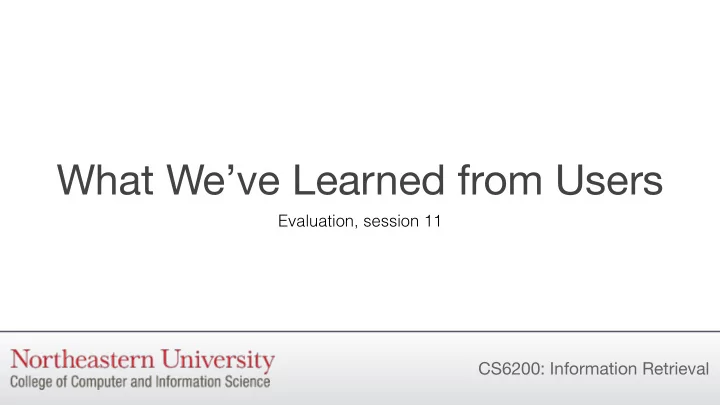

What We’ve Learned from Users Evaluation, session 11 CS6200: Information Retrieval
Users vs. Batch Evaluation Are we aiming for the right target? Many TF-IDF baseline vs. Okapi ranking papers, and the TREC interactive track, have studied whether user experience matches batch evaluation results. The statistical power of these papers is in question, but the answer seems to be: Queries Documents • Batch evaluation really corresponds to per User Retrieved better rankings and more user satisfaction. • But better rankings don’t necessarily lead to users finding more relevant content: users adapt to worse systems by running more queries, scanning poor results faster, etc. Source: Andrew H. Turpin and William Hersh. Why batch and user evaluations do not give the same results. SIGIR 2001.
Users vs. Metrics User eye-tracking results Are we measuring in the right way? Do the user models implied by our batch evaluation metrics correspond to actual user behavior? • Users scan in order overall, but with lots of smaller jumps forward and backward. Factors affecting prob. of continuing • Users usually just look at the top few documents, but sometimes look very deeply into the list. This depends on the individual, the query, the number of relevant documents they find, and… Source: Alistair Moffat, Paul Thomas, and Falk Scholer. Users versus models: what observation tells us about effectiveness metrics. CIKM 2013.
Users vs. Relevance Batch evaluation treats relevance as a binary or linear concept. Is this really true? • Users respond to many attributes in Factors Affecting Relevance order to determine relevance. Document attributes interact with user attributes in complex ways. • Different users weight these factors differently, and the weights may change over the course of a session. • Users’ ability to perceive relevance improves over a session, and their judgements become more stringent. Source: Tefko Saracevic. Relevance: A review of the literature and a framework for thinking on the notion in information science. Part III: Behavior and effects of relevance. J. Am. Soc. Inf. Sci. Technol. 58, 13 (November 2007)
Experts vs. General Users Finding Thousands of Experts in Log Data How do experts search differently, and 1. Viewed ≥ 100 pages over three months how can we improve rankings for experts? 2. 1% or more domain-related pages 3. Visited costly expert sites (such as dl.acm.org) • Experts use different vocabulary and Preferred Domain Differences By Expertise longer queries, so they can be identified with reasonable accuracy. • Experts visit different web sites, which could be favored for their searches. • The search engine could play a role in Query Vocabulary Change By Expertise training non-experts, by moving them from tutorial sites to more advanced content. Source: Ryen W. White, Susan T. Dumais, and Jaime Teevan. Characterizing the influence of domain expertise on web search behavior. WSDM 2009.
Social vs. IR Searching “Google hard” Queries Many recent studies have investigated the 55 MPH: If we lowered the US national speed limit to 55 relative merit of search engines and social miles per hour (MPH) (89 km/h), how many fewer barrels searching (e.g. asking your Facebook friends). of oil would the US consume every year? Pyrolysis: What role does pyrolytic oil (or pyrolysis) play One typical study asked 8 users to try to in the debate over carbon emissions? discover answers to several “Google hard” Social Tactics Used questions, either using only traditional search Targeted Asking: Asking specific friends for help via e- engines or only social connections (via online mail, phone, IM, etc. tools, “call a friend,” etc.). Network Asking: Posting a question on a social tool such as Facebook, Twitter, or a question-answer site. • Search engines returned more high-quality Social Search: Looking for questions and answers posted to social tools, such as question-answer sites. information in less time. Example Social Search Timeline • But social connections helped develop better questions, and helped synthesize material (when they took the question seriously), so led to better understanding. Source: Brynn M. Evans, Sanjay Kairam, and Peter Pirolli. Do your friends make you smarter?: An analysis of social strategies in online information seeking. Inf. Process. Manage. 46, 6 (November 2010)
Revisited Pages Studies indicate that 50-80% of web traffic involves revisiting pages the user has already visited. What can we learn about the user’s intent from the delays between visits? • There are clear trends in visit delays based on content type and the user’s intent, with high variance between users. • This can inform design of web browsers (e.g. history, bookmarks display) and search engines (e.g. document weighting based on individual revisit patterns). Source: Eytan Adar, Jaime Teevan, and Susan T. Dumais. Large scale analysis of web revisitation patterns. CHI 2008.
Wrapping Up The papers shown here are just the tip of the iceberg in terms of meaningful insights drawn from user studies. Interesting future directions: • More nuanced relevance judgements, and test collections and batch evaluations that reflect the complex, dynamic user reality. • Better integration of web search into browsers, social sites, and other tools, with real use patterns informing design decisions. • More customized experiences taking into account user type, information need complexity, prior individual usage patterns, etc.
Recommend
More recommend